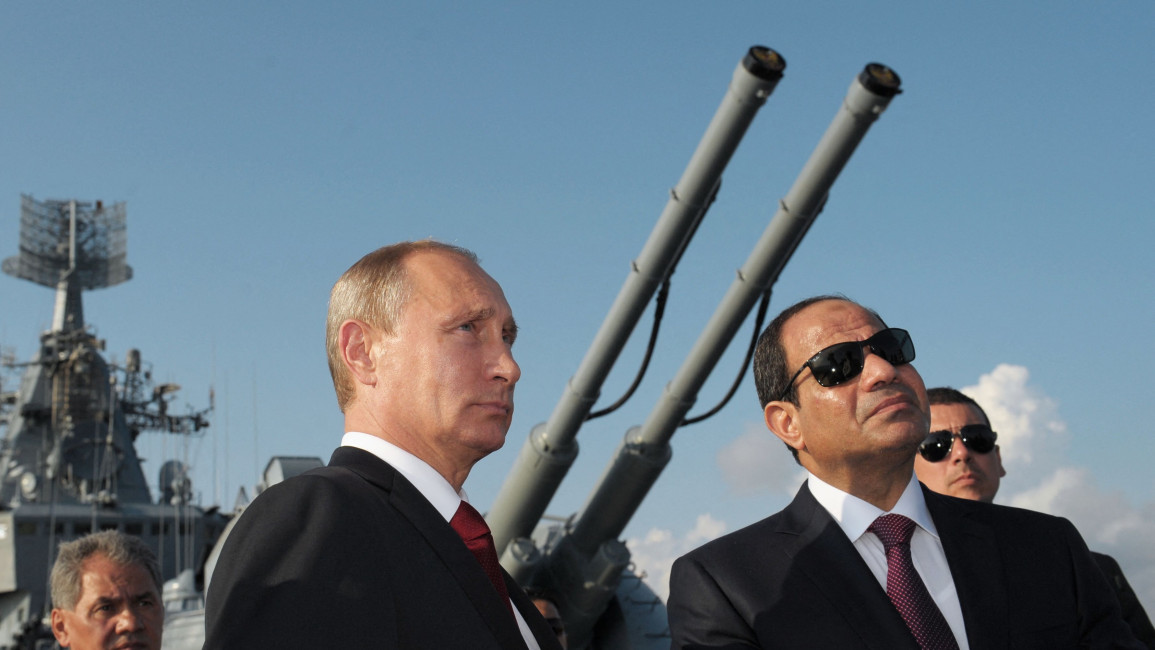
Was Egypt's Russia weapons gambit worth the risk?
It ought to be of extreme interest to the whole world that the Sisi regime apparently planned to covertly supply 40,000 rockets to Putin as part of Russia’s illegal invasion and occupation of Ukraine.
If true, this allegation, which emerged as part of a massive leak of highly classified Pentagon documents, could cause the biggest rift between the West and Egypt since the Suez crisis. Egypt, since the Camp David Accords, has been one of the largest recipients of US military aid, to the tune of $1.3 billion dollars per annum.
Sisi has also enjoyed lucrative relationships with the EU, with France, Germany and Italy willing to sell billions of dollars of arms to a regime that exercises ceaseless state terror, repression and brutality towards Egyptians.
It's here that we see both the potential motive for and the huge risk involved in Egypt’s alleged plan to arm Russia.
"Could this attempt by Egypt to come to the aid of its internationally beleaguered ally be the first signs of Egypt taking a definitive stance against the US?"
If Egypt was to be seen to be arming the heavily sanctioned, internationally ostracised Putin regime, whose sanctioning and ostracisation has been led by the US and EU, it would risk its ‘special relationship’ with both and would open itself up to sanctions, potentially pushing its already crippled economy to the point of collapse.
In recent times, the horrific human rights record of the Sisi regime has been impossible for the US to ignore, culminating in it withholding the largely tokenistic sum of $130 million from the $1.3 billion annual aid package.
Perhaps Sisi thought it was worth the risk?
Could it be that Sisi senses the beginnings of a wind of change from not simply the Biden administration but, more generally, a Democratic Party that has become bolder in its denunciations and calls for the defunding of the Sisi regime?
Egypt is approaching Russia's invasion of Ukraine with caution as it seeks to balance relations between the West & Moscow. But as our Cairo correspondent Thaer Mansour reveals, there's more to Sisi's middle-ground approach than meets the eye ⬇ https://t.co/Eseud5NH3L
— The New Arab (@The_NewArab) March 25, 2022
More generally, perhaps Sisi figures that the US, as it embraces a more realist and provincial foreign policy approach, is simply losing interest in the region and thus Egypt’s ‘special’ place in US foreign policy.
As some admittedly small disquiet has grown within Washington towards Sisi’s human rights, his regime over the past decade has grown economically and militarily closer to Russia. Despite US military aid and enthusiastic EU arms dealers, Russia is the single largest provider of weapons to Egypt.
Could this attempt by Egypt to come to the aid of its internationally beleaguered ally be the first signs of Egypt taking a definitive stance against the US?
Perhaps some part of all of the above is true and the Egyptian motive is part of a larger and perhaps more disquieting global reality, one that betrays both the weakening influence of the US over global affairs and the unanimity of global support for Ukraine within Western allies.
Along with the leak about Egypt’s rockets for Russia came another leak about the growing strength of a not-so-covert alliance between Russia and the UAE. The leaked document claims that Russian intelligence operatives are bragging about an alliance with the UAE to undermine the West, particularly the US and UK.
Despite the sanctions against Russia, the UAE has become a safe haven for Russians who want to move their assets and businesses out of Russia to circumvent sanctions.
The UAE and Russia, over the past decade, have become deeply aligned on foreign policy matters. Both have come to be ardent opponents of democratic and progressive change in the region.
It was a UAE-Russian-Egyptian alliance that tried to try to overthrow the legitimate government of Libya, while Assad’s Russian-bolstered rump state has found support from the UAE and Egypt.
"This is the scary reality of multipolarity – it doesn’t mean an abundance of sovereignty and self-determination, but rather an age of monsters, with tyrannies expanding their own interests in direct defiance of human rights and liberty"
The UAE, as Sisi’s largest sponsor, has used Egypt to do its bidding in the past, so would it be too much of a leap to imagine that Egypt’s rockets for Russia were orchestrated by a much wider plan by the Emirates to provide support for their allies in Moscow?
The financial influence of the UAE over Egypt is huge. Unlike the US-Egypt alliance, Sisi’s junior partnership with the UAE won’t ever be compromised by concern for human rights. It is thus not hard to imagine that Egypt would side with the UAE against US interests, despite the potential ramifications.
Moreover, the UAE, as with many MENA states, is ever more looking towards China and its growing power. Though China has remained officially ‘neutral’ during the Russian invasion of Ukraine, its sympathies lie with its Russian allies and direct Chinese support for Putin is becoming ever more likely.
This is where ideology is a factor. The MENA states, including Israel, are illiberal tyrannies whose interests lie in a world where illiberal tyranny is the norm. Whether it’s Sisi, Mohammed bin Zayed, Putin or Xi Jinping, these dictators are natural allies compared to the Western democracies.
Within MENA, the tides may be turning.
When Saudi Arabia wanted to broker normalisation with Iran, it looked not to its major ally the US, but to its other major ally China. This is the scary reality of multipolarity – it doesn’t mean an abundance of sovereignty and self-determination, but rather an age of monsters, with tyrannies expanding their own interests in direct defiance of human rights and liberty.
But the UAE is not going to abandon its Western allies and turn itself into an international pariah by explicitly endorsing Russia. Thus, getting Egypt to provide support for Russia would be a good way to maintain distance from repercussions while providing underhanded support.
In all likelihood, we’ll probably never fully know what lay behind the Egyptian rockets for Russia scandal. What is apparent is that while the world seems to have rallied to the causes of freedom and democracy in Ukraine, these leaks perhaps hint at the reality that such rallying is compromised by the plotting of the ferocious opponents of democracy and freedom everywhere.
Sam Hamad is a writer and History PhD candidate at the University of Glasgow focusing on totalitarian ideologies.
Join the conversation @The_NewArab.
Have questions or comments? Email us at: editorial-english@newarab.com
Opinions expressed in this article remain those of the author and do not necessarily represent those of The New Arab, its editorial board or staff.



